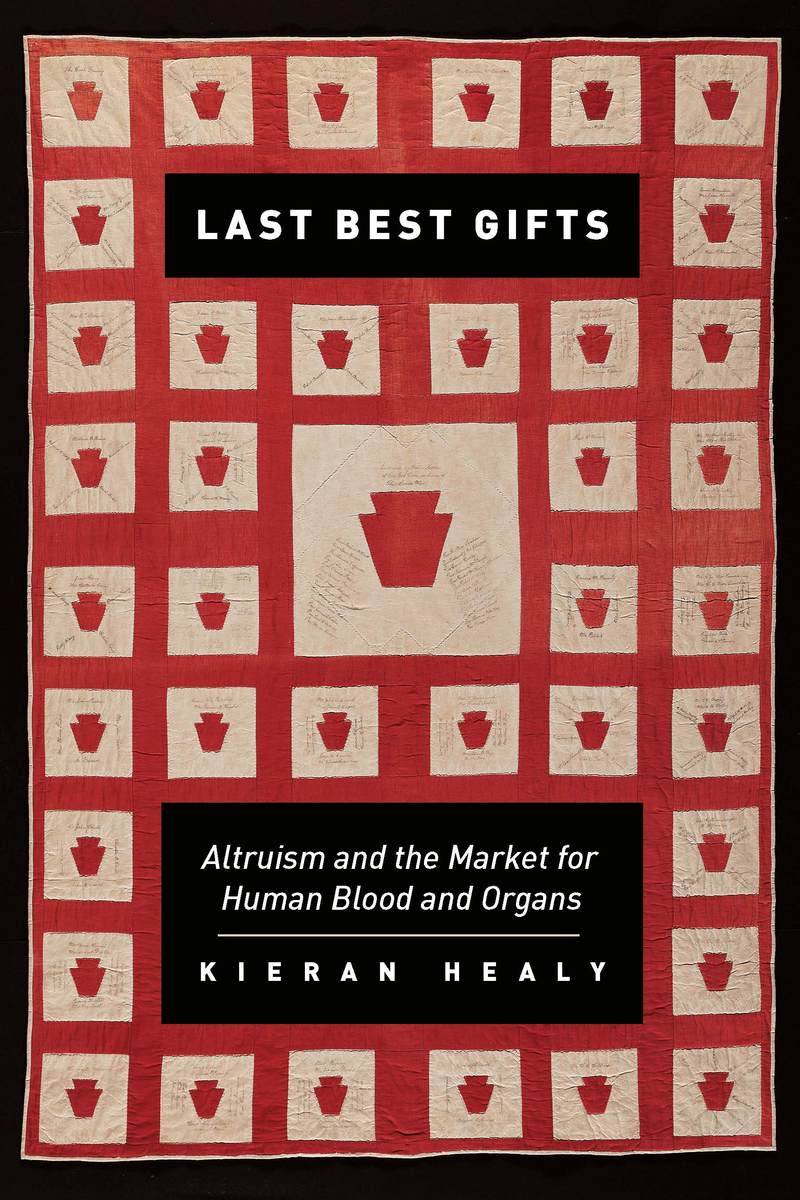Last Best Gifts
Altruism and the Market for Human Blood and Organs
University of Chicago Press, 2006
Cloth: 978-0-226-32235-3 | Paper: 978-0-226-32237-7 | Electronic: 978-0-226-32238-4
DOI: 10.7208/chicago/9780226322384.001.0001
Cloth: 978-0-226-32235-3 | Paper: 978-0-226-32237-7 | Electronic: 978-0-226-32238-4
DOI: 10.7208/chicago/9780226322384.001.0001
AVAILABLE FROM
University of Chicago Press (cloth, paper, ebook)Amazon Kindle (PDF)
Apple Books
Barnes & Noble Nook
Chegg Inc
DeGruyter Multi-User Ebook Program
ebrary
EBSCO eBooks (formerly NetLibrary)
Google Play
Kno
University Press Scholarship Online (UPSO)
ABOUT THIS BOOKAUTHOR BIOGRAPHYREVIEWSTABLE OF CONTENTS
ABOUT THIS BOOK
More than any other altruistic gesture, blood and organ donation exemplifies the true spirit of self-sacrifice. Donors literally give of themselves for no reward so that the life of an individual—often anonymous—may be spared. But as the demand for blood and organs has grown, the value of a system that depends solely on gifts has been called into question, and the possibility has surfaced that donors might be supplemented or replaced by paid suppliers.
Last Best Gifts offers a fresh perspective on this ethical dilemma by examining the social organization of blood and organ donation in Europe and the United States. Gifts of blood and organs are not given everywhere in the same way or to the same extent—contrasts that allow Kieran Healy to uncover the pivotal role that institutions play in fashioning the contexts for donations. Procurement organizations, he shows, sustain altruism by providing opportunities to give and by producing public accounts of what giving means. In the end, Healy suggests, successful systems rest on the fairness of the exchange, rather than the purity of a donor’s altruism or the size of a financial incentive.
Last Best Gifts offers a fresh perspective on this ethical dilemma by examining the social organization of blood and organ donation in Europe and the United States. Gifts of blood and organs are not given everywhere in the same way or to the same extent—contrasts that allow Kieran Healy to uncover the pivotal role that institutions play in fashioning the contexts for donations. Procurement organizations, he shows, sustain altruism by providing opportunities to give and by producing public accounts of what giving means. In the end, Healy suggests, successful systems rest on the fairness of the exchange, rather than the purity of a donor’s altruism or the size of a financial incentive.
AUTHOR BIOGRAPHY
Kieran Healy is assistant professor of sociology at the University of Arizona.
REVIEWS
“Exploring an issue usually left to philosophers and economists, Kieran Healy goes beyond ethical and economic debates and investigates the organizational and cultural contexts behind people’s motivations to donate ‘human goods.’ Whether enough of these much needed goods are provided depends less on potential donors’ altruistic motives than on the structure and practices of the organizations handling the donations. Elegantly argued and well-written, Last Best Gifts makes a landmark contribution to our understanding of the social foundation of the moral order of exchange.”--Jens Beckert, Max Planck Institute for the Study of Societies
“In Last Best Gifts, Kieran Healy offers a timely, sophisticated, and original analysis of the complex organizational terrain of blood and organ donation. In doing so, he unpacks the crucial role that organizations and institutions play in creating the contexts for, and the meanings of, giving. His analysis suggests that the relationship between gifts and commodities, between giving and selling, is more complex than many scholars acknowledge.”--Wendy Espeland, Northwestern University
"As an economic sociologist, Healy adds important dimensions to the intensifying debate over organ procurement."
— Virginia Postrel, New York Times Book ReviewTABLE OF CONTENTS
Illustrations
Acknowledgments
Exchange in Human Goods - Kieran Healy
Making a Gift - Kieran Healy
The Logistics of Altruism - Kieran Healy
Collection Regimes and Donor Populations - Kieran Healy
Organizations and Obligations - Kieran Healy
Managing Gifts, Making Markets - Kieran Healy
Appendix: Data Sources and Methods
Notes
Bibliography
Index
